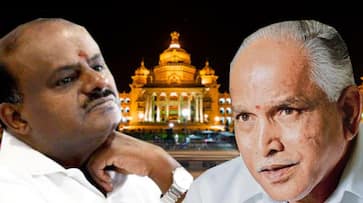The apex court's decision, which all analysts agree is well merited and balanced, has clearly put the Karnataka ruling dispensation in an unenviable situation.
You can hear the epitaph being written for the never-steady government of HD Kumaraswamy in Karnataka as the Supreme Court verdict on Wednesday (July 17) on the status of the 15 rebel MLAs almost makes it clear that the Congress-JD(S) coalition government will not survive the trust vote on the floor of the Assembly today (July 18).
The apex court's decision, which all analysts agree is well merited and balanced, has clearly put the Karnataka ruling dispensation in an unenviable situation. The SC has said that the 15 rebel MLAs cannot be forced to attend the ongoing Assembly session. And more importantly, the whip issued by the parties would not be operative on them.
This decision straight away has an impact on the numbers in the Karnataka Assembly and the confidence motion. At the time of writing, it is apparent that the 15 rebel MLAs, now ensconced in some swanky resort, would not attend the session. This would mean the effective strength of the House is 209 — including the Speaker. The majority number would be 105, and the BJP has on its side 105 MLAs, plus the backing of two Independents. The Congress, for its part, has 66 MLAs and the JD(S) 34. Their collective number is 100, short of even the half-way mark.
As things stand, the numbers surely don't favour the 14-month-old Kumaraswamy government, and is likely to fall just as the previous coalition governments in the state had.
The thing to note is the Supreme Court, in its verdict, has given a lot of leeway for the Speaker. "The Speaker can decide on the resignations (of the rebel MLAs) as and when he feels appropriate," the court said.
So the Speaker is at liberty to not accept the resignations of the rebel legislators. But in such a scenario, the rebel MLAs, who are under no compulsion to attend the session, would continue to stay away, paving the way for the fall of Kumaraswamy government.
With the Supreme Court deeming that the whip issued by the JD(S) and Congress parties to their MLAs not being operative, the rebel MLAs have nothing to worry as far as the trust vote is concerned.
Of course, the spectre of disqualification would still hang over the MLAs, and it is here that the Speaker has the room to play some mischief, as the court had restrained the Speaker from taking any decision till July 16 on the resignation and disqualification of the rebel MLAs. Since the date has passed, Speaker KR Ramesh Kumar can take a decision on the rebel MLAs any time.
If he decides to disqualify the rebel MLAs he has to give sufficient reason for the same, as not obeying the whip cannot be a ground in this present case. The threat of disqualification may not deter the rebels as after the SC decision they will feel emboldened. Even if the Speaker disqualifies them, you can be sure that they have enough ammunition to challenge it in the courts.
In the event, Kumaraswamy has to decide which exit to choose — face the confidence motion in the Assembly or quit quietly. But in this age and time, metrics is important, and Kumaraswamy would have been advised to seek a route that would make him look like a martyr. But his options are limited.
On Thursday, you can expect Kumaraswamy to give vent to his anger and frustration. He will for sure target the BJP for poaching his MLAs. The experiment of the last 14 months, however, will leave no sympathy either for Kumaraswamy's party or the government headed by him.
It may be recalled that former chief minister BS Yeddyurappa had to quit after holding office for 48 hours in May 2018. He faced the SC-ordered trust vote and lost.
Now the roles are reversed.
Last Updated Jul 19, 2019, 6:24 PM IST









![Salman Khan sets stage on fire for Anant Ambani, Radhika Merchant pre-wedding festivities [WATCH] ATG](https://static-gi.asianetnews.com/images/01hr1hh8y86gvb4kbqgnyhc0w0/whatsapp-image-2024-03-03-at-12-24-37-pm_100x60xt.jpg)
![Pregnant Deepika Padukone dances with Ranveer Singh at Anant Ambani, Radhika Merchant pre-wedding bash [WATCH] ATG](https://static-gi.asianetnews.com/images/01hr1ffyd3nzqzgm6ba0k87vr8/whatsapp-image-2024-03-03-at-11-45-35-am_100x60xt.jpg)


